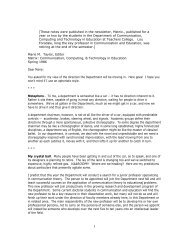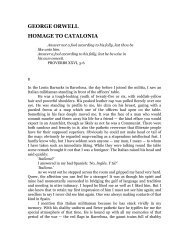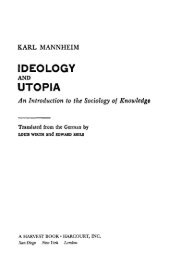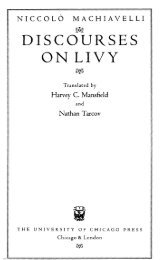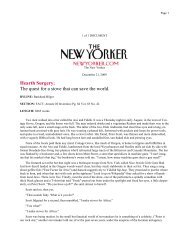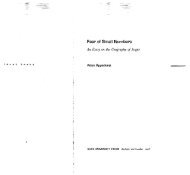THE REPUBLIC OF PLATO - Studyplace
THE REPUBLIC OF PLATO - Studyplace
THE REPUBLIC OF PLATO - Studyplace
You also want an ePaper? Increase the reach of your titles
YUMPU automatically turns print PDFs into web optimized ePapers that Google loves.
II. 364] JUSTICE VALUED FOR ITS RESULTS 49<br />
them a bad name, and make out that the unjust suffer all those<br />
penalties which Glaucon described as falling upon the good man<br />
who has a bad reputation: they can think of no others. That is<br />
how justice is recommended and injustice denounced.<br />
Besides all this, think of the way in which justice and injustice<br />
are spoken of, not only in ordinary life, but by the poets. All with<br />
one voice reiterate that self-control and justice, admirable as they<br />
may be, are difficult and irksome, whereas vice and injustice are<br />
pleasant and very easily to be had; it is mere convention to regard<br />
them as discreditable. They tell us that dishonesty generally pays<br />
better than honesty. They will cheerfully speak of a bad man as<br />
happy and load him with honours and social esteem, provided he<br />
be rich and otherwise powerful; while they despise and disregard<br />
one who has neither power nor wealth, though all the while they<br />
acknowledge that he is the better man of the two.<br />
Most surprising of all is what they say about the gods and virtue:<br />
that heaven itself often allots misfortunes and a hard life to the<br />
good man, and gives prosperity to the wicked. Mendicant priests<br />
and soothsayers come to the rich man's door with a story of a power<br />
they possess by the gift of heaven to atone for any offence that he<br />
or his ancestors have committed with incantations and sacrifice,<br />
agreeably accompanied by feasting. If he wishes to injure an enemy,<br />
he can, at a trifling expense, do him a hurt with equal ease, whether<br />
he be an honest man or not, by means of certain invocations and<br />
spells which, as they profess, prevail upon the gods to do their<br />
bidding. In support of all these claims they call the: poets to witness.<br />
Some, by way of advertising the easiness of vice, quote the words:<br />
'Unto wickedness men attain easily and in multitudes; smooth is<br />
the way and her dwelling is very near at hand. But the gods have<br />
ordained much sweat upon the path to virtue' 1 and a long road<br />
that is rough and steep.<br />
Others, to show that men can turn the gods from their purpose,<br />
cite Homer: 'Even the gods themselves listen to entreaty. Their<br />
hearts are turned by the entreaties of men with sacrifice and humble<br />
prayers and libation and burnt offering, whensoever anyone<br />
1 Hesiod. Works and Days, 287.



